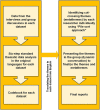Study Protocol for the SC-SD4ASA Project: A Self-Care/Self-Development Guidebook for Asylum-Seeking Adolescents
- PMID: 35937206
- PMCID: PMC9353327
- DOI: 10.3389/fpubh.2022.736673
Study Protocol for the SC-SD4ASA Project: A Self-Care/Self-Development Guidebook for Asylum-Seeking Adolescents
Abstract
From 2015 to 2016, about 1. 3 million refugees arrived in Europe. Half of them were children under the age of 18. The combination of (specially forced) migration and adolescence increase the risk of psychological problems among refugees including asylum-seeking children and adolescents. Therefore, along with the significant increase in the number of refugees, investigating effective ways to improve their health status has grown. The planned project aims to improve self-care and self-development among asylum-seeking adolescents aged 15-18. With the long-term goal of improving wellbeing and quality of life, this multi-method study aims to develop a self-care and self-development intervention guidebook for asylum-seeking adolescents. The SC-SD4ASA project will focus on three main work packages: 1. assessment of needs and knowledge concerning self-care and self-development; 2. development of a guidebook to promote self-care and self-development for asylum-seeking adolescents; and 3. assessment of the guidebook fidelity, reliability, and validity. For the first work package, an intra-triangulation approach including three qualitative methods [in-depth interviews, focus group discussions and photographic means (photovoice)] will be used. The collected data will be analyzed using cross-cultural and multilingual approach to thematic analysis, known as meta-theme analysis. The results of the first stage will be utilized for developing the guidebook in the second (main) work packages. The guidebook fidelity will be assessed based on the National Institutes of Health Behavior Change Consortium fidelity framework in the last workplan. Empowering asylum-seeking adolescents with self-care /self-development skills can help them to sustain their wellbeing and better manage the challenges in their new situation. When successfully implemented, a guidebook will be developed to support all individuals involved in planning, managing, and promoting health among asylum-seeking adolescents that can be used for future self-care/self-development programs in practice.
Keywords: asylum-seeking adolescents; intervention development; multi-method analysis; refugee crisis; self-care; self-development.
Copyright © 2022 Mohammadzadeh, Heinrichs, Pilz González and Stock.
Conflict of interest statement
The authors declare that the research was conducted in the absence of any commercial or financial relationships that could be construed as a potential conflict of interest.
Figures
Similar articles
-
Problems faced by Syrian refugees and asylum seekers in Switzerland.Swiss Med Wkly. 2020 Oct 26;150:w20381. doi: 10.4414/smw.2020.20381. eCollection 2020 Oct 19. Swiss Med Wkly. 2020. PMID: 33105021
-
A cross-sectional survey of the mental health needs of refugees and asylum seekers attending a refugee health clinic: a study protocol for using research to inform local service delivery.BMC Psychiatry. 2014 Dec 24;14:356. doi: 10.1186/s12888-014-0356-y. BMC Psychiatry. 2014. PMID: 25539842 Free PMC article.
-
Creative expression workshops as Psychological First Aid (PFA) for asylum-seeking children: An exploratory study in temporary shelters in Montreal.Clin Child Psychol Psychiatry. 2020 Apr;25(2):483-493. doi: 10.1177/1359104519891760. Epub 2019 Dec 8. Clin Child Psychol Psychiatry. 2020. PMID: 31814432
-
A literature review of the psychological status of asylum-seeking children: implications for nursing practice.Br J Nurs. 2019 Apr 11;28(7):461-466. doi: 10.12968/bjon.2019.28.7.461. Br J Nurs. 2019. PMID: 30969872 Review.
-
Efficacy and acceptability of psychosocial interventions in asylum seekers and refugees: systematic review and meta-analysis.Epidemiol Psychiatr Sci. 2019 Aug;28(4):376-388. doi: 10.1017/S2045796019000027. Epub 2019 Feb 11. Epidemiol Psychiatr Sci. 2019. PMID: 30739625 Free PMC article.
Cited by
-
Participant recruitment among vulnerable populations: An experience from a qualitative study among refugee adolescents in Germany.Open Res Eur. 2023 Nov 7;2:47. doi: 10.12688/openreseurope.14654.2. eCollection 2022. Open Res Eur. 2023. PMID: 37974661 Free PMC article.
References
-
- Mohammadzadeh M, Awang H, Ismail S, Kadir Shahar H. Improving emotional health and self-esteem of Malaysian adolescents living in orphanages through Life Skills Education program: a multi-centre randomized control trial. PLoS ONE. (2019) 14:e0226333. 10.1371/journal.pone.0226333 - DOI - PMC - PubMed
Publication types
MeSH terms
LinkOut - more resources
Full Text Sources





